....
CANADA 150 ans de Confédération
..
CANADA 150 years of Confederation
....
....
Dieu est au coeur de l'histoire politique canadienne. Découvrez comment et pourquoi.
En septembre 2015, nous étions en pleine campagne électorale canadienne. A cette occasion, l'ImMédi@ a exploré les liens parfois tendus, et pourtant toujours essentiels, qui unissent Dieu et la gouvernance de l'État.
..
God is at the heart of Canadian political history. Discover how and why.
In September 2015, we were in the Canadian election campaign. On this occasion, ImMédi@ explored the sometimes tense relationship, yet still essential that unite God and the governance of the state.
....
....
La Cour suprême du Canada a clairement fait fi, dans ses derniers jugements, de l'esprit de la Constitution canadienne exprimé dans son préambule : «Attendu que le Canada est fondé sur des principes qui reconnaissent la suprématie de Dieu […]».
Ironiquement, nous avons vu aussi cette année les premiers ministres du Canada et Québec rivaliser d’empressement auprès du pape François, afin de l’inviter à fêter avec nous en 2017, alors que ce sera justement le 150e de la Constitution canadienne, jumelé au 375e de la fondation de la ville de Montréal.
Un brin paradoxal. De quoi faire naître un petit sourire en coin.
..
In its last judgments, the Supreme Court of Canada has clearly ignored the spirit of the Canadian Constitution as expressed in its preamble: "Whereas Canada is founded upon principles that recognize the supremacy of God […]."
Ironically, this year we have also seen the prime ministers of Canada and Quebec eagerly compete to invite Pope Francis to come celebrate with us in 2017 when it will precisely be the 150th anniversary of the Canadian Constitution, coupled with the 375th anniversary of the founding of the city of Montreal.
A trifle paradoxical. Which cannot help but make us grin.
....
....
Pour naviguer dans les différentes sections de cette page, vous pouvez dérouler vers le bas ou utiliser le menu ci-dessous:
..
To navigate through the different sections of the page, you can scroll down or use the following menu:
....
....
....
Ces paradoxes dénotent une tension latente au sujet de la mention de Dieu dans l'espace public. À quand le moment où Dieu sera définitivement mis en dehors des affaires de l'État canadien? Serait-ce pour bientôt?
Advenant une réouverture de la Constitution à l’occasion de son 150e anniversaire en 2017, décidera-t-on d’y enlever la mention de Dieu, donnant ainsi préséance au principe-roi de liberté individuelle, comme si nous étions devenus insidieusement une république laïque?
Question de réfléchir à la question et de solidifier notre argumentation sur l'importance de la place de Dieu dans l'État canadien, Périfmédia a préparé ce dossier. Bonne lecture!
..
These paradoxes indicate a latent tension regarding the mention of God in the public arena. When will be the time when God will be permanently dismissed from the affaires of the Canadian state? Could it be soon?
In the event that the Constitution be reopened on the occasion of its 150th anniversary in 2017, will we decide to remove the mention of God, thus giving precedence to the sovereign principle of individual freedom, as if we had insidiously become a secular republic?
To allow us to reflect upon the issue and strengthen our arguments about the importance of God's place in the Canadian state, Perifmedia has prepared this package. Enjoy your reading!
....
....Un peu d'histoire:..A little bit of history:....
1534
....
Le découvreur du Canada, Jacques Cartier, dès qu'il accoste, élève une croix portant les armoiries du roi de France. Il aurait pu se contenter de hisser le drapeau royal; mais dans la relation écrite que Cartier adresse au roi par la suite, son intention apparaît clairement : il désire exprimer la souveraineté de Dieu sur le monde, au-delà même des questions de confessions religieuses.
..
As soon as the discoverer of Canada, Jacques Cartier docked his ship, he planted a cross bearing the coat of arms of the king of France. He could have been content to raise the royal flag; but in the written communication that Cartier later addresses to the king, his intention is clear: he wants to express the sovereignty of God over the world, even beyond questions of religious denominations
....
....Jacques Cartier érigeant une croix à Gaspé en 1534. Crédit: Walter Baker, Bibliothèque et archives Canada..Jacques Cartier planting a cross in Gaspé in 1534. Credit: Walter Baker, Library and Archives Canada....
....Consécration du Canada à saint Joseph en 1624..Canada's consecration to Saint Joseph in 1624....
1624
....
Alors que la jeune colonie de Québec connaît de graves difficultés, des missionnaires récollets proposent de consacrer le Canada à saint Joseph qui incarne «par délégation», pourrait-on dire, l'autorité de Dieu sur le pays. Samuel de Champlain, représentant politique en Nouvelle-France à ce moment, adhère à ce geste. Tous les habitants et plusieurs Amérindiens s'unissent aussi à cette demande de protection. Le pape Grégoire XVI confirmera ce geste en 1834 en nommant saint Joseph «patron principal du Canada».
..
At a moment when the young colony of Quebec faces serious hardships, Recollect missionaries propose to consecrate Canada to Saint Joseph who embodies "by delegation", one might say, the authority of God in the country. Samuel de Champlain, the political representative in New France at that time, adheres to this gesture. All residents and several Indians also join in this plea for protection. Pope Gregory XVI will, in 1834, confirm this gesture by naming Saint Joseph "Principal Patron Saint of Canada."
....
1643
....
Paul Chomedey de Maisonneuve, pour remercier Dieu d'avoir protégé Ville-Marie d'une perte certaine, transporta une croix sur le sommet du mont Royal, au milieu de ce qui est devenu Montréal, la première métropole du Canada. Maisonneuve agissait en tant que gouverneur. Son geste était donc public et comportait une dimension politique.
..
Paul Chomedey de Maisonneuve, to thank God for having protected Ville-Marie of an assured loss, carried a cross to the top of Mount Royal, in the middle of what is now Montreal, Canada's first metropolis. Maisonneuve was acting as governor. His gesture was, therefore, a public one that carried a political dimension.
....
1867
....
Autre fait significatif : les fondateurs de la Confédération, au moment de former un pays, n'ont pas voulu devenir à proprement parler ni une monarchie - structure politique fortement critiquée à l'époque -, ni une république, bien que cette dernière fût populaire.
Ils ont donc créé un Dominion. Le nom de cette nouvelle forme politique, tout comme la devise du Canada, sont inspirés du psaume 72. Ce psaume annonce que le dominion de Dieu va s'étendre «d'une mer à l'autre et du fleuve jusqu'aux confins de la terre».
..
Another significant fact: when the time came to create the country, the Founders of Confederation did not want to, strictly speaking, neither become a monarchy - a political structure that was strongly criticized at the time - nor a republic, even though the latter was popular.
So they created a Dominion. The name of this new political form, as well as Canada's motto, are inspired by Psalm 72. This psalm announces that the dominion of God will extend "from sea to sea and from the river unto the ends of the earth."
....
....Capsule vidéo:..Video clip:....
....
Dieu et la Constitution canadienne: quels changements ferons-nous à la Constitution si elle est réouverte lors de son 150e anniversaire, en 2017?
Notre Constitution définit notre façon de vivre ensemble, et Dieu y est présent:
..
GOD AND THE CANADIAN CONSTITUTION: WHAT CHANGES WILL WE MAKE TO THE CONSTITUTION IF IT IS REOPENED ON ITS 150TH ANNIVERSARY IN 2017?
Our Constitution defines the way we live together, and God is present:
....
....
Préambule de la Charte des droits et libertés du Canada de 1982:
«Attendu que le Canada est fondé sur des principes qui reconnaissent la suprématie de Dieu ET la primauté du droit»
..
Preamble to the Charter of Rights and Freedoms of Canada, 1982:
"WHEREAS CANADA IS FOUNDED UPON PRINCIPLES THAT RECOGNIZE THE SUPREMACY OF GOD AND THE RULE OF LAW"
....Des auteurs s'expriment sur les enjeux liés aux élections canadiennes du 19 octobre prochain:..Authors speak on issues related to the Canadian elections to be held next October 19th....
....Découvrez leurs idées et partagez-nous les vôtres. .. Discover their ideas and share yours with us. ....
....
La croyance en Dieu au Canada en perte de vitesse?
Moins qu'il n'y paraît…
Une vaste majorité des Canadiens croient en Dieu, à 82,3%. Et ils s'identifient à la religion chrétienne, à 67,3%.
..
The belief in God in Canada losing momentum?
Less than it seems…
A vast majority of Canadians believe in God at 82.3%. And they identify themselves as Christians, at 67.3%.
....
[french]
Statistique Canada, Enquête nationale 2011
Sarah Wilkins-Laflamme, www.ceetum.umontreal.ca/documents/capsules/2014/wilk-fr-2014.pdf
....
Alors que Stephen Harper, premier ministre sortant et chef du Parti conservateur, n'hésitait pas à exprimer publiquement la place de Dieu dans l'État canadien, notamment en terminant ses discours par «God bless Canada», les autres chefs de parti sont plus discrets, mais il arrive qu'ils s'expriment sur le sujet. Pourquoi? Croyance personnelle ou stratégie politique?
..
[english]
General Social Survey 2011, Statistics Canada
Sarah Wilkins-Laflamme, www.ceetum.umontreal.ca/documents/capsules/2014/wilk-en-2014.pdf
While Stephen Harper, the outgoing prime minister and leader of the Conservative Party, did not hesitate to publicly express God's place in the Canadian state, with an occasional "God bless Canada", the other party leaders are more discreet, but on occasion, they express themselves on the subject. Why? Personal belief or political strategy?
....
[french]
Statistique Canada, Enquête nationale 2011
Sarah Wilkins-Laflamme, www.ceetum.umontreal.ca/documents/capsules/2014/wilk-fr-2014.pdf
....
En fait, l'image médiatique et la langue de bois rendent rarement compte des affiliations profondes de nos dirigeants. Voici un extrait concernant M. Justin Trudeau, alors qu'il était député libéral de la circonscription de Papineau.
..
In fact, the media image and the prevarication rarely testify to the deep affiliations of our leaders. Here is a quote from Mr. Justin Trudeau, while he was a Liberal MP for the riding of Papineau.
....
[english]
General Social Survey 2011, Statistics Canada
Sarah Wilkins-Laflamme, www.ceetum.umontreal.ca/documents/capsules/2014/wilk-en-2014.pdf
....
L'auteure, Mme Andréa Richard, Québécoise militant en faveur de la laïcité, désirait voir retirer le préambule de la Charte canadienne des droits et libertés où il est fait mention de Dieu:
..
The author, Andréa Richard, a Québécois activist in favor of secularism, wanted to see withdrawn the preamble to the Canadian Charter of Rights and Freedoms, which refers to God:
....
....
«J’ai décidé d’aller voir un député libéral, explicitement pour lui demander s’il accepterait de faire quelque chose au fédéral, en vue d’enlever ce préambule qui divise le Québec et le Canada… J’ai choisi Justin Trudeau, député de Papineau, d’une part parce que je pensais qu’étant jeune il serait sans doute ouvert d’esprit… et d’autre part, me disant que son père ne voulait pas ce préambule. En effet, la charte rédigée en juin 1980 ne devait pas avoir de préambule : C’est dans la version d’avril 1981 qu’on l’a ajouté. Pierre Eliott Trudeau ne voulait pas de référence à Dieu dans la Charte. Mais pour que les provinces de l’Ouest, en particulier le Manitoba, signent la charte, et aussi par des pressions relevant des religieux et des Conservateurs, il dut se plier. En 1999, le député Svend Robinson, du Nouveau Parti démocratique, a proposé à la Chambre des communes du Canada que la mention de Dieu soit retirée du préambule, mais il n’eut pas gain de cause. Quelle ne fut pas ma surprise ! Non seulement on avait l’impression que M. Justin Trudeau ne voulait pas nous écouter parler, (j’avais demandé à Mme Marie-Michelle Poisson, présidente du mouvement laïc québécois de m’accompagner, ainsi que Mme Diane Guilbault, auteure de « Démocratie et égalité des sexes. ») ce fut un non catégorique, nous disant que lui il est croyant, qu’il a besoin de Dieu, que sans les religions on ne peut avoir des valeurs etc…»
..
"I decided to approach a Liberal member of Parliament, to explicitly request that he agreed to do something at the federal government level, to get rid of the preamble that divides Quebec and Canada ..." I chose Justin Trudeau, a member of Parliament for Papineau, because I thought that being of a younger generation, he would probably be open-minded ... and furthermore reminding myself that his father did not want this preamble. Indeed, the charter drafted in June 1980 meant to have no preamble: It was in the version of April 1981 that it was added. Pierre Eliott Trudeau did not want a reference to God in the Charter. But in order to get the Western provinces, particularly Manitoba,to sign the Charter, and also because of pressures from religious and Conservative factions, he had to agree. In 1999, New Democratic Party MP Svend Robinson proposed to the House of Commons of Canada that the mention of God be removed from the preamble, but he failed in his quest. Oh! to my surprise! Not only was it felt that Mr. Justin Trudeau did not want to listen to us, (I had asked Mme Marie-Michelle Poisson, president of the Quebec secular movement, to accompany me, and Mme Diane Guilbault, author of "Democracy and Gender Equality.") It was a categorical no, reminding us that he is a believer, that he needs God, and that without religions there can be no system of values, etc…"
....
-Andréa Richard, www.service.vigile.quebec/A-la-fois-si-simple-et-pourtant
....
Que répondrait M. Trudeau, maintenant qu'il est chef du Parti libéral du Canada (PLC)?
Les politiciens se retrouvent tôt ou tard devant un électorat varié, des réseaux d'influence et des choix difficiles. Pour acquérir le pouvoir ou le conserver, quels compromis sont-ils prêts à faire?
Récemment, lors d'une entrevue concernant la prière à la Chambre des communes, plusieurs députés de chaque parti ont exprimé l'importance de Dieu dans leur vie. Auront-ils le courage d'exprimer l'importance de Dieu dans la gouvernance de l'État?
..
What would be Mr. Trudeau's answer, now that he is the leader of the Liberal Party of Canada?
Sooner or later, politicians find themselves confronted with a diverse electorate, networks of influence and difficult choices to be made. To gain or retain power, what compromises are they prepared to make?
Recently, during an interview on prayer in the House of Commons, several members of each party expressed the importance of God in their lives. Will they have the courage to express the importance of God in the governance of the state?
....
....
Pour alimenter nos réflexions:
Extraits choisis de La Couronne invisible, essai sur la Constitution canadienne
par Francine Dupras et Jean-Marc Rufiange.
..
Deepen our reflection:
Extracts from The Invisible Crown
by Francine Dupras and Jean-Marc Rufiange.
....
....
«C’est ici que la conjonction Autorité et Pouvoir en découvre une autre que plusieurs contestent sur la scène publique: le rapport naturel entre Dieu et le Politique.
Dieu, que l’on soit croyant ou athée, représente l’autorité morale la plus haute. Considéré comme le créateur et l’ordonnateur des choses, Dieu est non seulement l’autorité morale suprême, il fonde le droit. Son droit d’Auteur, ou, plus exactement, son Autorité, donne une assise à tous les droits qui policent la société. L’acharnement avec lequel certains régimes politiques cherchent à exclure Dieu de la Cité, le communisme ou encore la laïcité, par exemple, témoigne de son ascendant. Leur souci premier est d’effacer tout signe public pouvant évoquer cette autorité morale.
Par ailleurs, dans nos régimes démocratiques, l’Homme est au centre de la société. L’autorité morale est conçue dans les termes juridiques des chartes. La balance des droits et libertés des individus et des collectivités mène régulièrement à l’impasse. Les Cours « suprêmes » sont alors sollicitées comme Arbitres pour se prononcer sur des questions d’ordre moral et constitutionnel. En ce domaine, l’ascendant qu’acquiert le juridique sur le politique a des conséquences qu’il faut questionner.»
..
"It is here that the conjunction of Authority and Power unveils another one, that many challenge on the public scene: the natural relationship between God and Politics.
God, whether one is a believer or an atheist, represents the highest moral authority. Considered as the creator and the ruler of all things, God is not only the supreme moral authority, he is the foundation of righteousness. His Autorship, or more appropriately His Authority, provides a foundation to all the rights that police today's society. The persistence with which certain political regimes seek to exclude God from its gorvernment, communism or secularism, for example, testifies to its ascendancy. Their primary concern is to erase any public sign that evokes This moral authority.
Moreover, in our democratic regimes, Man has been put right the center of society. Moral authority is conceived within the legal terms of the charters. The balance of rights and freedoms of individuals and communities regularly leads to an impasse. The Supreme Courts are then solicited as arbitrators to rule on moral and constitutional issues. In this field, the legal ascendancy over politics has consequences that must be questioned. "
....
....
«Même si la mention de Dieu dans une structure gouvernementale comporte certaines exigences morales, controversées comme on le sait – les levées de boucliers sont rapides en ce domaine –, craindrait-on plus ou moins consciemment ce qui pourrait prendre sa place? Un Canada sans Préambule, ou un Québec sans crucifix, ouvrirait la porte à quel despotisme? Il est commun de dire que le communisme athée a remplacé Dieu par la dictature des masses; le nazisme par le culte de la race aryenne. Fonder un pays en reconnaissant d’abord la suprématie de Dieu serait-il une façon de le protéger contre les déséquilibres inhérents à certains régimes comme le totalitarisme, le fascisme nationaliste ou même l’anarchie des droits individuels engendrée par une démocratie complètement débridée? Les régimes théocratiques ne garantissent pas l’équilibre non plus. Dans leurs Constitutions, l’Autorité relève habituellement d’une Caste capable d’instaurer un suprémacisme clérical ou héréditaire.
Il importe donc de distinguer le rapport qui s’établit naturellement entre Dieu et l’État, du concept de séparation de l’Église et de l’État. La mention de Dieu dans une Constitution n’a rien à voir avec la pratique d’une religion ou l’appartenance à une Église; elle n’est pas confessionnelle à proprement parler. Le rapport entre Dieu et l’État est de l’ordre des fondements du politique. Il est d’ailleurs au cœur des délibérations qui ont marqué l’évolution constitutionnelle du Canada.»
..
"Even if the mention of God in a governmental structure includes certain moral requirements, controversial as we know - it rapidly causes an outcry- would we fear, more or less consciously, what could take its place? A Canada without a Preamble, or a Quebec without a crucifix, would open the door to what despotism? It is common to say that atheistic communism has replaced God by the dictatorship of the masses; the Nazism by the cult of the Aryan race. Would it be a way to protect a country by first recognizing God's supremacy against the imbalances inherent in certain regimes such as totalitarianism, nationalist fascism or even the anarchy of individual rights engendered by a completely unbridled democracy? Theocratic regimes do not guarantee equilibrium either. In their Constitutions, the Authority usually relates to a Caste capable of establishing clerical or hereditary supremacism.
It is important, therefore, to distinguish the relationship which is naturally established between God and the State, and the concept of the separation of the Church and the State. The mention of God in a Constitution has nothing to do with the practice of a religion or belonging to a Church; strictly speaking, the mention of God has nothing to do with confessionality. The relationship between God and the State is of the order of the foundations of politics. It is at the heart of the deliberations that have marked the constitutional evolution of Canada."
....
....
«Dieu avant le roi, c’est aussi ce que proclamait Thomas More (1478-1535) jusque sur l’échafaud : " Je mourrai bon serviteur du roi et de Dieu en premier ". Cela signifie que le roi ne peut s’approprier ni la primauté ni le pouvoir absolu, qui appartiennent à Dieu. Sous cet angle, la monarchie absolue est aussi éloignée de Dieu, politiquement parlant, que le communisme athée. Précédant la condamnation de Thomas More d’un siècle, il y eut celle de Jeanne d’Arc (1412-1431). Durant son procès ecclésiastique, à la question : " Ne croyez-vous pas être sujette à l’Église qui est sur la terre, notre saint Père le Pape, cardinaux, évêques et autres prélats d’Église ? ", elle répondit : "Messire Dieu, premier servi". L’Anglais et la Française ont donc connu le martyre en professant la prééminence de Dieu non seulement sur l’État mais sur l’Église, sans pour autant contester le respect de l’autorité dévolue à chacune de ces deux institutions.»
..
"God before the king is what Thomas More (1478-1535) proclaimed even on the scaffold: "I will die a good servant of the king and of God first." This means that even a king cannot appropriate either primacy or absolute power, which belong to God. From that perspective, absolute monarchy is as remote from God politically as atheistic communism. Preceding the condemnation of Thomas More by more than a century, there was that of Joan of Arc (1412-1431). During her ecclesiastical trial, to the question: "Do you not believe that you are subject to the Church on earth, our Holy Father the Pope, cardinals, bishops and other prelates of the Church?" She replied, "My Lord, God first served." The Englisman and the French woman, therefore, have known martyrdom by professing the pre-eminence of God not only over State but over the Church, without denying respect for the authority vested in each of these two institutions.
....
....
Cliquez ici pour poursuivre la lecture de La Couronne invisible sur le site Tendances et Enjeu.
..
Click right here for continue reading The Invisible Crown on website "Tendances et Enjeux" (Trends and Issue). We are sorry but this document is only available in French.
....
....
Les martyrs canadiens,
nos saints patrons
..
The Canadian martyrs,
our patron saints
....
....
Priez avec nous. Que Dieu reste au fondement de notre pays!
..
Pray with us. May God remain the foundation of our country!
....
crédit: martyrs' shrine.com
....
Des élections fédérales ont eu lieu le 19 octobre 2015, journée où l'Église catholique célèbre la mémoire des saints martyrs canadiens. Prions-les d'éclairer notre gouvernement, quel qu'il soit!
Ils ont donné leur vie pour que l'Évangile soit aux sources de ce nouveau pays en friche; ils sauront intercéder pour que la place de Dieu au coeur de nos cités soit préservée, voire aimée et développée!
..
Federal elections were held October 19th 2015, the day the Catholic Church celebrates the memory of Canada's holy martyrs. Let's ask them to guide our government, whichever it is!
They gave their lives so that the Gospel be at the source of this developing nation; they will know how to intercede so that the place of God in the heart of our cities is preserved, even loved and nurtured!
....
....
Les saints Martyrs canadiens sont Jean de Brébeuf, Noël Chabanel, Antoine Daniel, Charles Garnier, René Goupil, Isaac Jogues, Jean de la Lande et Gabriel Lalemant.
..
The holy Canadian Martyrs are Jean de Brébeuf, Noël Chabanel, Antoine Daniel, Charles Garnier, Rene Goupil, Isaac Jogues, Jean de la Lande and Gabriel Lalemant.
....
....
Et pourquoi pas faire une neuvaine aux saints martyrs canadiens !
Cliquez ici et priez avec nous pour le Canada et pour tous les Canadiens et Canadiennes!
..
And why pray a novena to the holy martyrs of Canada!
An English version of Novena is available on the Martyrs' Shrine website. Click here to access.
....
Saint Joseph, Patron du Canada..Saint Joseph, Patron Saint of Canada
....
Accompagne notre peuple en marche vers ses destinées providentielles. Tu l’as protégé dès son berceau, tu l’as défendu aux heures difficiles de son histoire. Sois-lui favorable aujourd’hui comme tu l’as toujours été.
Rends-lui sa simplicité des origines, sa foi intrépide, ses moeurs admirables.
Sois notre guide et notre protecteur dans l’évolution importante que nous traversons maintenant; garde-nous dans la paix et la charité pour que nous travaillions ensemble au développement de notre grand pays et au progrès de la vie chrétienne sur notre continent.
..
Accompany our nation on its march towards a providential destiny. You protected it from its cradle, you defended it through the difficult hours of its history. Be favorable today as you have always been.
Restore it to its original simplicity, its intrepid faith, its admirable ways.
Be our guide and protector for the important evolution we are going through now; keep us at peace and charitable so that we work together towards the development of our great country and the progress of the Christian life on our continent.
....
....
Que parmi nous se lèvent de nombreux apôtres, afin que tous puissent partager avec nous les grâces de la foi chrétienne.
Amen.
..
May many apostles rise up from our midst, so that all may share with us the graces of the Christian faith.
Amen.
....


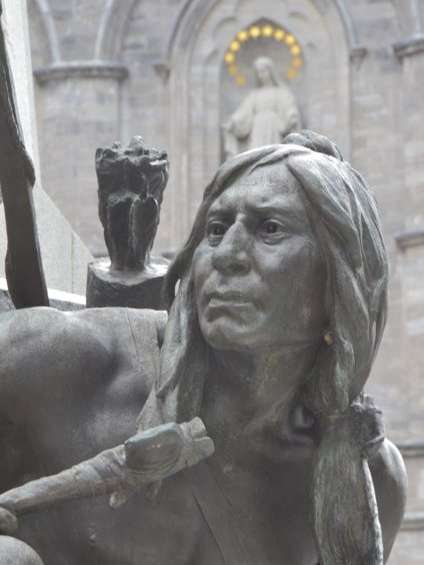
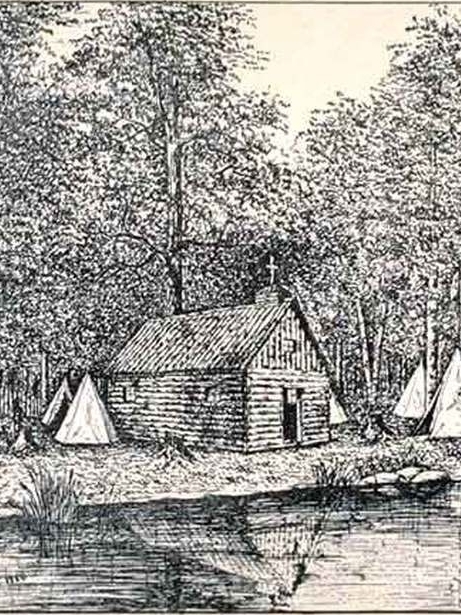
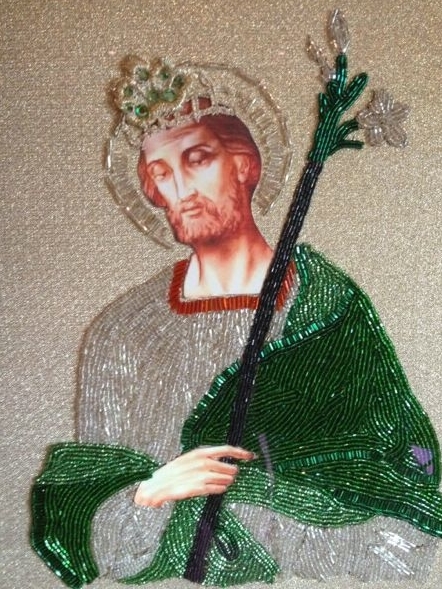

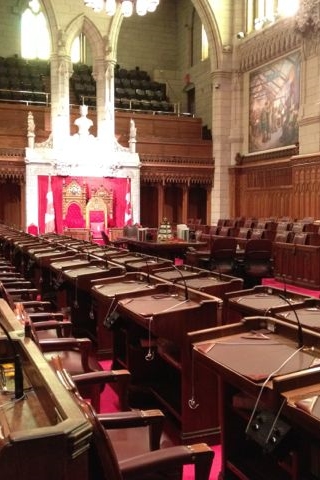
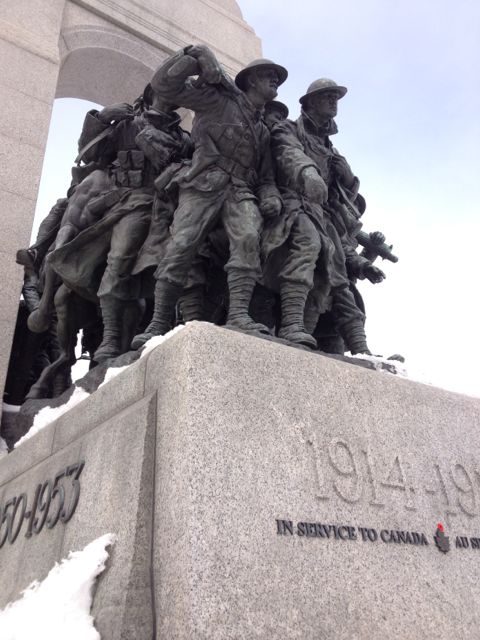







![[french]Statistique Canada, Enquête nationale 2011 Sarah Wilkins-Laflamme, www.ceetum.umontreal.ca/documents/capsules/2014/wilk-fr-2014.pdf](https://images.squarespace-cdn.com/content/v1/532da291e4b01f203fa34893/1439856174942-FWFYKKTNO6430XUSCNV5/image-asset.jpeg)
![[english]General Social Survey 2011, Statistics Canada Sarah Wilkins-Laflamme, www.ceetum.umontreal.ca/documents/capsules/2014/wilk-en-2014.pdf](https://images.squarespace-cdn.com/content/v1/532da291e4b01f203fa34893/1497618058130-QKSG7MTGN0XER2NY7YQ9/image-asset.png)
![[french]Statistique Canada, Enquête nationale 2011 Sarah Wilkins-Laflamme, www.ceetum.umontreal.ca/documents/capsules/2014/wilk-fr-2014.pdf](https://images.squarespace-cdn.com/content/v1/532da291e4b01f203fa34893/1440271604808-OSY4A1CSJV9ZSWRYXDHD/image-asset.jpeg)
![[english]General Social Survey 2011, Statistics Canada Sarah Wilkins-Laflamme, www.ceetum.umontreal.ca/documents/capsules/2014/wilk-en-2014.pdf](https://images.squarespace-cdn.com/content/v1/532da291e4b01f203fa34893/1497618232140-Z34LQ4EVYCA0B3EHVVMN/image-asset.png)




....
Ces paradoxes dénotent une tension latente au sujet de la mention de Dieu dans l'espace public. À quand le moment où Dieu sera définitivement mis en dehors des affaires de l'État canadien?
..
These paradoxes indicate a latent tension regarding the mention of God in the public arena. When will be the time when God will be permanently dismissed from the affairs of the Canadian state?
....